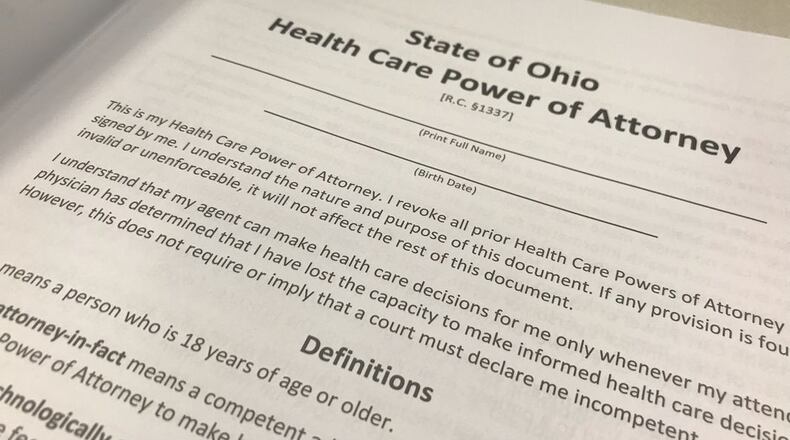Without these plans, if someone is in an accident or too sick to speak for themselves, their loved ones are left guessing and dealing with the guilt over whether they made the right call. It also allows families to avoid costly medical procedures and family fights.
Sometimes family members are even surprised to learn at the hospital after an emergency that they had been named health care power of attorney.
“It‘s really important to, to have these conversations, a car accident could happen tomorrow somebody would have to speak on your behalf to make your healthcare decisions,” said Lisa Henderson, VP of health initiatives with Greater Dayton Area Hospital Association.
The association and Ohio’s Hospice are urging people to have these conversations and are sponsors the Decide to Be Heard program, offering free help from facilitators trained to walk people through conversations about end-of-life wishes.
It’s not clear how many people locally have spelled out their end-of-life wishes. A 2017 study published in Health Affairs reported about one third of Americans have completed any form of advance care directive. Also in 2017 the Dayton Daily News reported a study by Wright State University found about 9% to 12% of adults in the Dayton area have their end-of-life wishes written down.
While everyone is recommended to have their wishes spelled out, the importance for Ohioans is also growing as the state ages. Miami University Scripps Gerontology Center reports Ohio’s older population will become an increasing proportion of the state’s residents; by 2025, more than 1 in 4 Ohioans will be age 60 and older.
While the end goal of the Decide to Be Heard initiative is to have formal documents like a living will and name a health care power of attorney, the first step is for people to take inventory of what they want, which many people have never thought about or shared with others.
Facilitators can help people walk through personal conversations, such as what makes life worth living, any spiritual beliefs are and if they know someone who died who didn’t get the kind of end-of-life care they would have wanted.
People who feel they “wouldn’t want to be a burden” should explore what that specifically means to them, whether that’s not wanting family to be in the daily caregiving role or not wanting people to wonder what kind of treatment you wanted.
Henderson said while people should talk through with their health care power of attorney, it is also good to let other close relationships know their preferences.
“We encourage individuals to have those conversations with multiple family members who might be present in those situations to say ‘hey I’ve picked my daughter, she’s going to make the decision, but I want you all to understand what my wishes are.’ It eliminates some of that stress and angst if that situation were to occur,” she said.
Henderson said people are advised to create a living will, which allows you to write down what choices you want for your future medical care and to name someone as their power of attorney who will make decisions according to your wishes.
People should also regularly review these forms every few years or after big life events, because preferences and family relationships can change.
What is an advanced directive?
After starting the advanced planning conversation, advanced directives are legal documents that spell out your choices if you were unable to make decisions for yourself. In Ohio, it comes in two legal forms:
• A living will, which allows you to write down what choices you want for your future medical care.
• A power of attorney that lets you choose a person as your Health Care Agent. If you no longer can make your own health care choices, this person will make them for you according to your wishes.
How do I create these documents?
There are many options for creating this paperwork.
Decidetobeheard.org has information on getting the conversation started and creating advance care directives. The initiative is from the Greater Dayton Hospital Association and members and Ohio’s Hospice.
Another resource is mydirectives.com created by the Mayo Clinic. The website will walk you through questions to think about what you want and help creating a plan and forms.
Want personal help?
If you want to schedule an appointment with a trained facilitator to talk about your end-of-life wishes, go to decidetobeheard.org/seeking-a-facilitator/. You can have a one-on-one appointment or meet with you and your health care agent.
About the Author

